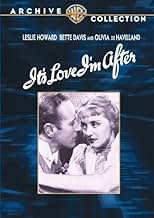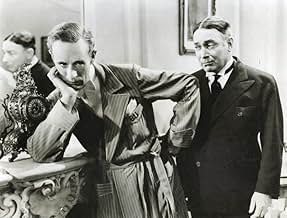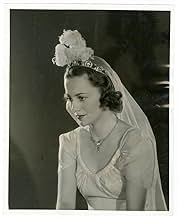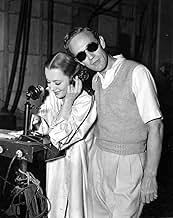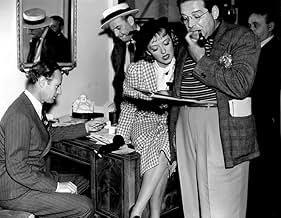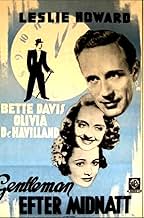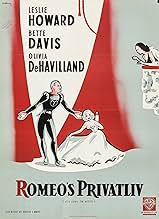NOTE IMDb
7,3/10
2,8 k
MA NOTE
Un acteur de théâtre est courtisé par une admiratrice éperdument amoureuse de lui tandis qu'il essaie de se raccommoder avec sa fiancée actrice avec laquelle il a une relation tumultueuse.Un acteur de théâtre est courtisé par une admiratrice éperdument amoureuse de lui tandis qu'il essaie de se raccommoder avec sa fiancée actrice avec laquelle il a une relation tumultueuse.Un acteur de théâtre est courtisé par une admiratrice éperdument amoureuse de lui tandis qu'il essaie de se raccommoder avec sa fiancée actrice avec laquelle il a une relation tumultueuse.
- Réalisation
- Scénario
- Casting principal
- Récompenses
- 3 victoires au total
Georgia Caine
- Mrs. Kane
- (as Georgia Craine)
Grace Field
- Mrs. Babson
- (as Grace Fields)
Edmund Mortimer
- Mr. Kane
- (as Ed Mortimer)
Thomas R. Mills
- Second Butler
- (as Thomas Mills)
Avis à la une
It's Love I'm After concerns a famous acting couple (Leslie Howard and Bette Davis) whose fighting often outweighs their love for each other. When a young girl (Olivia De Havilland) develops an intense crush on Howard, her fiancée takes it upon himself to make a deal with him to be mean to her. Howard does it to improve his moral standing but takes a few relapses as everything he does excites Havilland even more. This is a truly funny comedy with an excellent cast.
Olivia De Havilland appears here in an early role. Her enthusiasm and innocence make her seem younger than she is and very high-strung. However, her performance is perfect for the part.
It seems that in Hollywood there were two legitimate British actors: Howard and Charles Laughton. Laughton's weight forced him into fatherly roles and Howard's good looks pushed him toward romantic leads. Howard's presence in this film reflects his talents as an actor and this stereotype but the two are incorporated brilliantly. He shines the brightest.
Olivia De Havilland appears here in an early role. Her enthusiasm and innocence make her seem younger than she is and very high-strung. However, her performance is perfect for the part.
It seems that in Hollywood there were two legitimate British actors: Howard and Charles Laughton. Laughton's weight forced him into fatherly roles and Howard's good looks pushed him toward romantic leads. Howard's presence in this film reflects his talents as an actor and this stereotype but the two are incorporated brilliantly. He shines the brightest.
It's Love I'm After (Archie Mayo, 1937) is just a delight, an incredibly well-written screwball comedy that keeps the expertly-crafted witticisms flying thick and fast. Given the wrong material or the wrong direction, Leslie Howard could appear unbearably smug, but here he gets the role of a lifetime - and makes the most of it. He's a conceited ham, with two eyes for the ladies, who spends most of his time off-stage (and some of it on) warring with thespian girlfriend Bette Davis. Resolving one day to turn over not just a new leaf, but a whole book of them, he's forced to play the last word in unthinking bounders to disillusion the fiancée (Olivia de Havilland) of an old friend's son. It's a great set up: a reformed character having to appear even more reprehensible than before in order to do the decent thing, and it's developed in consistently surprising, imaginative ways.
And then there's the cast. Howard is flawless as the conceited, confused, compromised, increasingly desperate cad - who has more than a little of John Barrymore about him - with Davis giving her best comedic performance as his long-suffering lover, who packs an explosive temper. De Havilland is perfectly cast, both cloying and appealing as the starstruck girl who'll excuse anything her rambunctious idol does, while Eric Blore excels as Howard's valet and co-conspirator. Blore, one of the great supporting comics, is great in everything, but I've never seen him as funny as here. Displaying his customary lack of vanity and willingness to do anything for a laugh, he spends most of one scene making ridiculous bird noises and another displacing his silly toupee. Blore also gets the best line of the film, responding to Bonnie Granville's cry of "I know something you don't know" with one of the funniest, most petulant one-liners I've ever heard.
Drawing on Shakespeare to gets both its pathos and its laughs, in the vein of To Be or Not to Be and Withnail & I, It's Love I'm After is streets ahead of most other golden era comedies: intelligent, romantic and uproariously funny, eliciting the particular buzz that comes with watching something that's clearly very special.
And then there's the cast. Howard is flawless as the conceited, confused, compromised, increasingly desperate cad - who has more than a little of John Barrymore about him - with Davis giving her best comedic performance as his long-suffering lover, who packs an explosive temper. De Havilland is perfectly cast, both cloying and appealing as the starstruck girl who'll excuse anything her rambunctious idol does, while Eric Blore excels as Howard's valet and co-conspirator. Blore, one of the great supporting comics, is great in everything, but I've never seen him as funny as here. Displaying his customary lack of vanity and willingness to do anything for a laugh, he spends most of one scene making ridiculous bird noises and another displacing his silly toupee. Blore also gets the best line of the film, responding to Bonnie Granville's cry of "I know something you don't know" with one of the funniest, most petulant one-liners I've ever heard.
Drawing on Shakespeare to gets both its pathos and its laughs, in the vein of To Be or Not to Be and Withnail & I, It's Love I'm After is streets ahead of most other golden era comedies: intelligent, romantic and uproariously funny, eliciting the particular buzz that comes with watching something that's clearly very special.
Why this comedy is unremembered is a mystery to me. It's a witty, fast-paced film, all of the stars give good, funny performances and was critically applauded in its time. Howard and Davis, better known for Of Human Bondage and The Pertrified Forest show largely untapped comic talents; in Bondage and Forest, one often outshines the other, but in this film, they seem to go way over the top trying to outdo each other. Of course that's perfect for this movie and their characters, a hammy, battling stage couple who get along even less after De Havilland comes into the picture. Eric Blore provides priceless comic support. If you're a fan of screwball comedy or any of the stars, I highly recommend it.
Bette Davis made too few film comedies. The only ones that come to mind are this film, THE BRIDE CAME C.O.D., THE MAN WHO CAME TO DINNER, JUNE BRIDE, ALL ABOUT EVE (yes, it is actually a witty comedy), and POCKETFUL OF MIRACLES. There probably are others that have slipped my mind. In MR. SKEFFINGTON, Fanny does have a flibbertigibbet type of character, frequently breaking off luncheon dates with an unseen female friend, and annoying people with her selfish problems (the scene with George Coulouris as Dr. Byles is hysterical for his justifiable explosion). But most of the film is serious about her mistreatment of the loving Job Skeffington. Of the comedies I listed, ALL ABOUT EVE and JUNE BRIDE are best for script and performance highlights for Davis. Monty Wooley, Mary Wickes, Jimmy Durante, and Anne Sheridan are far funnier in THE MAN WHO CAME TO DINNER. The comics who control POCKETFUL OF MIRACLES are Thomas Mitchell, Edward Everett Horton, and (best of all) Peter Falk. THE BRIDE CAME C.O.D. is Davis's best film with Warner Brothers co-superstar Jimmy Cagney, and it is her best piece of slapstick - but she hated it because she spent several scenes removing cactus needles from her rear end (literally).
IT'S LOVE I'M AFTER is very funny, but it is also interesting as the last film Davis did with Leslie Howard. They had been together in her first great dramatic hit, OF HUMAN BONDAGE, and then had played the tragic, late blooming lovers, in THE PETRIFIED FOREST. This is their only comedy after all the earlier tragedy (Davis dies in BONDAGE, and Howard is gunned down by Humphrey Bogart in FOREST). The three films should be shown together by some film society.
They play a famous "Lunt and Fontaine" or "Southern and Marlowe" acting pair from the stage, who can't keep their egos from constantly clashing. Davis, at the start of the film, is performing a love scene with Howard, and has taken the trouble to eat onions (lots of 'em) before they go on. He goes through the scene without revealing how he detests her (at present) though he manages to whisper to her his true feelings. Only one year earlier Howard had played Romeo in M.G.M.'s production of the Shakespeare play, with Norma Shearer as Juliet. Many critics felt that Howard and Shearer, no matter how well they emoted, were too old for the parts (which call for teenage types). I defy you to even accept their performances in the balcony scene, etc., after seeing Howard and Davis in this film.
Due to the script, Davis disappears for too many scenes, while Howard has to try to undue the schoolgirl crush of Olivia de Havilland. He does this, assisted by Eric Blore, by being boorish and demanding at the home of de Havilland's father, George Barbier. It does not work according to every plan Howard hatches, although de Havilland does managed to lose interest in him at the end (with the aid of Davis, and Howard's pompous ego). The film works pretty well as a comedy. May I recommend the sequence involving Blore trying to give a signal to his boss, and finding himself at war with some birds. Leslie was quite good in the film, but Eric was ... well Eric Blore was always the dependable comic actor.
IT'S LOVE I'M AFTER is very funny, but it is also interesting as the last film Davis did with Leslie Howard. They had been together in her first great dramatic hit, OF HUMAN BONDAGE, and then had played the tragic, late blooming lovers, in THE PETRIFIED FOREST. This is their only comedy after all the earlier tragedy (Davis dies in BONDAGE, and Howard is gunned down by Humphrey Bogart in FOREST). The three films should be shown together by some film society.
They play a famous "Lunt and Fontaine" or "Southern and Marlowe" acting pair from the stage, who can't keep their egos from constantly clashing. Davis, at the start of the film, is performing a love scene with Howard, and has taken the trouble to eat onions (lots of 'em) before they go on. He goes through the scene without revealing how he detests her (at present) though he manages to whisper to her his true feelings. Only one year earlier Howard had played Romeo in M.G.M.'s production of the Shakespeare play, with Norma Shearer as Juliet. Many critics felt that Howard and Shearer, no matter how well they emoted, were too old for the parts (which call for teenage types). I defy you to even accept their performances in the balcony scene, etc., after seeing Howard and Davis in this film.
Due to the script, Davis disappears for too many scenes, while Howard has to try to undue the schoolgirl crush of Olivia de Havilland. He does this, assisted by Eric Blore, by being boorish and demanding at the home of de Havilland's father, George Barbier. It does not work according to every plan Howard hatches, although de Havilland does managed to lose interest in him at the end (with the aid of Davis, and Howard's pompous ego). The film works pretty well as a comedy. May I recommend the sequence involving Blore trying to give a signal to his boss, and finding himself at war with some birds. Leslie was quite good in the film, but Eric was ... well Eric Blore was always the dependable comic actor.
While Bette Davis and Leslie Howard are amusing as two battling lovers who also happen to be ham actors, the surprise of this little comedy is Olivia de Havilland as the moonstruck girl with a crush on matinée idol Basil Underwood (Howard). De Havilland never had a better ingenue role and she makes the most of it. Amusing to note that three years later she and Howard would be paired as Melanie and Ashley in 'Gone with the Wind'. Strange that previous comments fail to even mention her presence in this film! Even Bette Davis admitted that de Havilland had the better role with more footage--and claimed to dislike the film. However, all three leads are excellent--with Eric Blore stealing scenes as the butler frequently told by Leslie Howard to "Pack my bags!" Bonita Granville is rather irritating as de Havilland's brat sister and Spring Byington is her usual chipper self. Patric Knowles, as de Havilland's boyfriend and ultimate love partner, is wonderful in his amusing role as the man who sets the whole plot into action. Catch this one on Turner Classic Movies if you can. It's well worth it. Leslie Howard shows a real flair and delight in playing his ham actor--one of his finest comedy roles. A highlight is a confrontation between him and de Havilland when she declares: "I was in love with Clark Gable last year. If I can get over him, I can certainly get over you!" Screwball comedies don't get any better than this!
Le saviez-vous
- AnecdotesThis is the third and final pairing of Leslie Howard and Bette Davis (after L'emprise (1934), and La forêt pétrifiée (1936)), and their only comedy together.
- GaffesAfter Basil ties (off camera) his ascot before breakfast, the tie's spots are showing. Immediately after, same scene, the tie has stripes. Then, in the third scene immediately following, the tie again shows spots.
- Citations
Basil Underwood: I say, Digges, you don't suppose I've aroused her slap-me-again-I-love-it complex?
- ConnexionsFeatured in AFI Life Achievement Award: A Tribute to Bette Davis (1977)
Meilleurs choix
Connectez-vous pour évaluer et suivre la liste de favoris afin de recevoir des recommandations personnalisées
- How long is It's Love I'm After?Alimenté par Alexa
Détails
- Date de sortie
- Pays d’origine
- Langue
- Aussi connu sous le nom de
- It's Love I'm After
- Lieux de tournage
- Pasadena, Californie, États-Unis(West mansion)
- Société de production
- Voir plus de crédits d'entreprise sur IMDbPro
- Durée1 heure 30 minutes
- Couleur
- Mixage
- Rapport de forme
- 1.37 : 1
Contribuer à cette page
Suggérer une modification ou ajouter du contenu manquant

Lacune principale
By what name was L'aventure de minuit (1937) officially released in India in English?
Répondre

